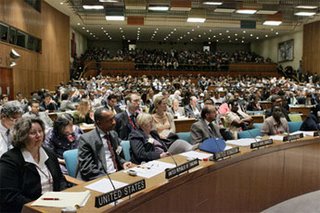BASSETERRE, ST. KITTS, JUNE 4TH 2006 (CUOPM) - The world has been told that there is a great deal of concern in the Caribbean region over the overall expansion and feminisation of the HIV/AIDS epidemic.
There are 300,000 persons including 30,000 who became infected in 2005, currently living with HIV in the Caribbean and there is a great deal of concern in the region over the overall expansion and feminisation of the HIV/AIDS epidemic, the United Nations was told on Friday.
“The prevalence rate in women 15-24 years is two to six times higher than men of similar age group. The Caribbean total death toll due to AIDS since the start of the epidemic is estimated between 350,000 and 590,000 claiming an estimated 24,000 lives in 2005 alone. Among young people 15 to 44 years, AIDS is the leading cause of death. Since February 2004, there has been more than a 50% increase in the number of people living with HIV/AIDS on treatment. However, access to HIV-treatment drugs remains unequal across the region,” St. Kitts and Nevis’ Prime Minister Hon. Dr. Denzil L. Douglas said.
Speaking on behalf of the Caribbean Community (CARICOM) and the Pan Caribbean Partnership Against HIV/AIDS, the regional network that embraces Governments, Non-Governmental Organizations, international and regional agencies, business, labour, civil society and representatives of people living with HIV/AIDS, across the English, Spanish, Dutch and French Speaking Caribbean, the St. Kitts and Nevis leader said the goal is to reaped the benefits of a harmonised international partnership by 2010.
“By 2010 our health and social systems will form the basis of an improved and integrated network of services for prevention, diagnosis, treatment, care and support. By 2010, we hope that every country in the Caribbean would have introduced supportive legislation and a policy framework to protect the vulnerable populations, in particular men who have sex with men, commercial sex workers and prisoners. But we will also, place emphasis on the particular needs of the disabled and children, for they too are vulnerable,” Prime Minister told the international community represented by presidents, prime ministers, health ministers and HIV/AIDS activists around the world.
He said that by 2010, the region plans to show the world that every Caribbean woman, man and child has access to relevant information, knowledge and support services by which to take preventive action, including knowing his or her own status.
“By 2010 we would have organized our regimes for care, treatment and support. By 2010, the Caribbean would have drastically reduced the spread of this disease through universal access. These Mr. Chairman, ladies and gentlemen, are our goals. In this season of World Cup soccer, you will understand when I say we must score. Because, for us win, we must score, concluded Prime Minister Douglas. |









